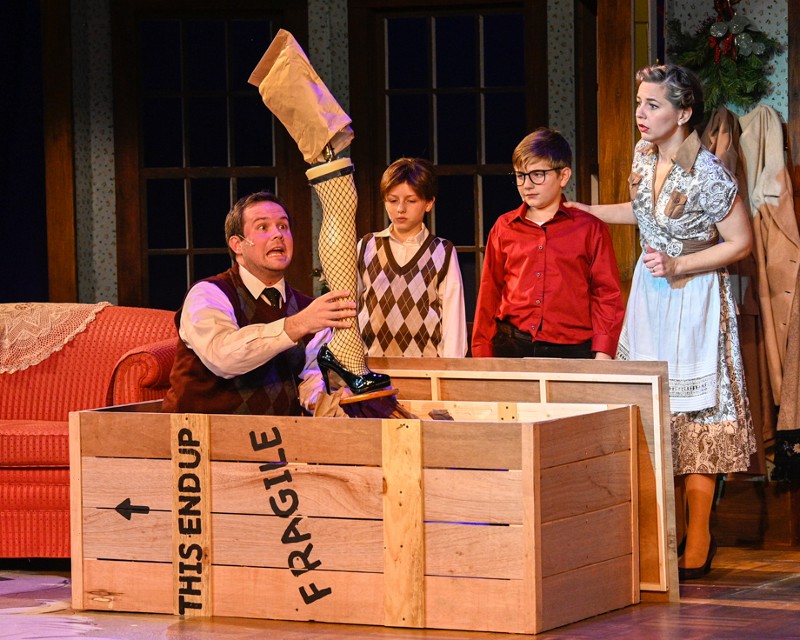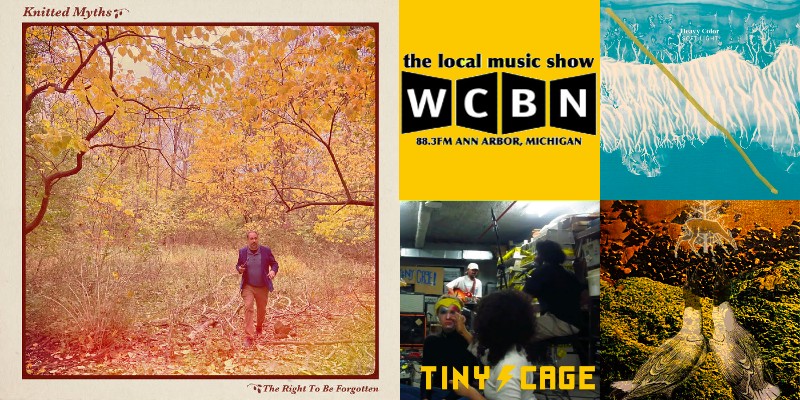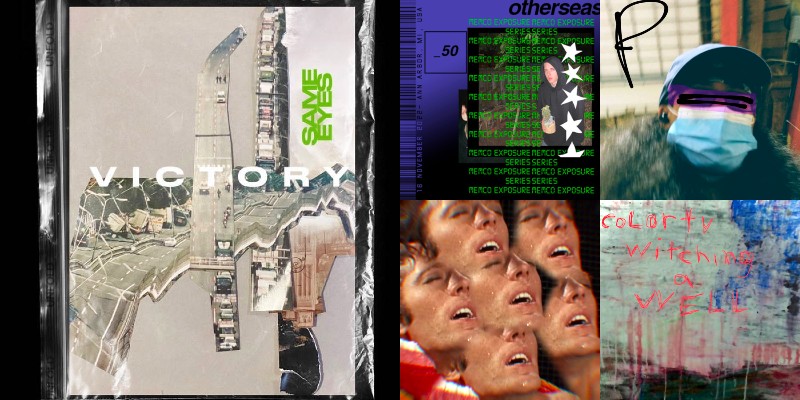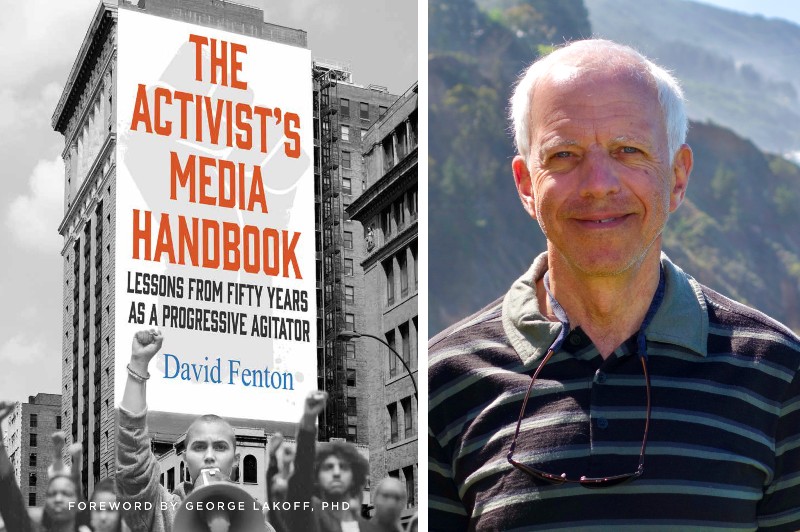In Real Time: Chickenwire Canöe’s rock-opera concept album “Joey Wendt” tells the tale of a budding conspiracy theorist during the pandemic

Brian Delaney admires how Gordon Lightfoot documented the 1975 sinking of the SS Edmund Fitzgerald in Lake Superior.
The Chickenwire Canöe guitarist applauds the Canadian folk singer-songwriter with respectfully recounting the tragedy and remembering the 29 lives lost in his 1976 hit, “The Wreck of the Edmund Fitzgerald.”
“For somebody like Gordon Lightfoot to be able to write that story to song in a way that didn’t capitalize on somebody else’s calamity, that’s always stuck with me. That’s art in the moment … you’re looking at a situation and documenting it,” said Delaney, who’s from Dexter.
“When I thought about that calamity and then thought about the pandemic, I knew it would be a real crime not to have somebody document it in a somewhat well-rounded way.”
By summer 2020, he landed on a pandemic-themed album and contacted childhood friend Mike Gentry, now Chickenwire Canöe’s vocalist-guitarist.
“I just sat down and wrote a proposal to Mike, and I briefly outlined with bullet points what it could be as a concept,” Delaney said.
“The concept was a record of vignettes of what we were going through related to the pandemic. Some of the best art will take you back to a moment in time where you’re like, ‘This could have only happened then.’”
U-M Gilbert and Sullivan Society celebrates its 75th anniversary with pirates, policemen, and paleontologists

With cat-like tread, a rollicking band of pirates will step upon the stage from December 8-11 as they have done about every four years since 1949 when the two-year-old University of Michigan Gilbert and Sullivan Society (UMGASS) gave its first performance of The Pirates of Penzance.
Sparkling tunes and lyrics replete with irony, wit, conflict, and romance make it no surprise that UMGASS would celebrate its 75th anniversary with a production of Gilbert & Sullivan’s two-act comic operetta. Director David Andrews says, “It’s probably the best known and best loved of Gilbert and Sullivan’s pieces.” Andrews says the show doesn’t just have catchy melodies that people hum on the way out: “Some people are humming on the way in,” he says of the well-known show.
Encore Theatre's “A Christmas Story: The Musical" sings the praises of the classic film

A stage musical based on a beloved film classic—like, say, A Christmas Story: The Musical, now being staged at Dexter’s Encore Theatre—can be a double-edged sword.
Yes, it’s a known commodity, so people will often line up to see it without too much coaxing, but the show’s creators must delicately thread the needle of staying true enough to the original material to satisfy fans, while also providing enough surprises and new elements to remake the story in a new medium.
If anything, the musical adaptation of A Christmas Story—with a book by Joseph Robinette, and music and lyrics by University of Michigan alums Benj Pasek and Justin Paul (before they won Tonys for Dear Evan Hansen)—errs slightly on the side of dogged loyalty to the 1983 movie’s script, straining to check every classic-moment box.
Yet the reason Story has so many such boxes is because it is a funny, charmingly rendered, nostalgic slice of American childhood, set in a small Indiana town in 1940.
Drawn from radio stories told by humorist Jean Shepherd in the 1950s, Story focuses on the pre-Christmas trials and tribulations of 9-year-old Ralphie Parker (Gavin Cooney), who desperately wants a Red Ryder BB gun. The problem is, he can’t convince his parents (David Moan and Jessica Grové), his teacher (Alley Ellis), or even a department store Santa (Mitchell Hardy) that if he gets one, he won’t “shoot his eye out.”
But Ralphie keeps scheming while also dealing with bullies, theme papers, and a gruff father who’s chasing his own form of validation.
First, let’s address the baby elephant in the room:
Friday Five: Knitted Myths, Deja Senti, Heavy Color, Unmanned Ship, WCBN Local Music Show sets

Friday Five highlights music by Washtenaw County-associated artists and labels.
This week features prog-pop by Knitted Myths, electronic excursions via Deja Senti, jazz-influenced experimental songs by Heavy Color, sludge rock from Unmanned Ship, and a slew of live sets from WCBN's Local Music Show.
Andrea Carlson's "Future Cache" exhibit at UMMA imagines decolonized landscapes for the native peoples violently removed from their land

“Gidayaa Anishinaabewakiing / You are on Anishinaabe land”
The title of Andrea Carlson’s multidimensional installation Future Cache at the University of Michigan Museum of Art (UMMA) references the Anishinaabe storage practice of using underground caches to store supplies through the seasons.
The centerpiece of Future Cache, however, doesn't train your gaze toward the ground but up to the sky.
UMMA's Vertical Gallery has a towering 40-foot-high wall of memorial text. Written by the Burt Lake Tribal Council and presented in Anishinaabemowin (translated by Margaret Noodin and Michael Zimmerman Jr.) and English, the words commemorate the historical and ongoing effects of colonial violence on the Cheboiganing (Burt Lake) Band of Ottawa and Chippewa Indians.
On the lower level, a cache of Carlson's paintings complements the tower of text with imagined decolonized landscapes, as well as two carefully selected artifacts. Curator Jennifer M. Friess writes in the gallery text that Carlson aims "to draw attention to the theft of Indigenous land and to express solidarity with Indigenous communities on the long journey toward restitution.”
"Conversations on Mortality" at 22 North looks to transcend the silence about the dying side of living

Conversations on mortality are difficult, often avoided, and in America, they are traditionally taboo. The 22 North gallery in Ypsilanti welcomes the thought-provoking exhibit Conversations on Mortality, which confronts our impermanence, the inevitability of death.
The exhibition's multimedia works engage with loss, mourning, and what is left behind once someone is gone. Described by the curators as “a chance to transcend the silence,” Conversations on Mortality offers works driven by the lives of the artists. Not only do they address the complexity of their mortality and loss of loved ones, but also their experiences of living with disability, illness, and the impact of COVID-19.
Entering the space, hanging lanterns in an autumnal palette cheerily frame serendipitously matching works by curators Sharlene Welton and Tim Tonachella. I had a chance to speak with Welton who is both the show’s curator and an artist when I visited 22 North. Welton said she created the lanterns as part of an interactive element to the opening night, where visitors were able to decorate and write their names on the lanterns before hanging them. The pieces by Welton (a large painting) and Tonachella (two photographs of cemetery views) were brought in last minute when an artist was unable to make the show, but adding the works ended up being a great aesthetic success.
Welton and Tonachella’s gallery statement notes the overlapping threads among the works, as artists grapple with the questions, “How do we embrace the changes that come from death and dying, and more importantly, how we assimilate the loss into our daily living?” Though these may, ultimately, be unanswerable questions, they are worth asking—especially when operating within a mainstream American culture that predominantly ignores them.
Songs of the Night: Berlin Philharmonic brought Mahler's 7th back to Hill Auditorium

I’d be shocked if there were a single empty seat in the house last Saturday night.
As people ducked out of the swirling snow flurries of the storm that would blanket the town over the course of the next few hours, the lobby of the 3,000-seat Hill Auditorium began to fill to the brim with eagerly bustling patrons.
And no wonder—it’s not every day that you have the chance to hear what’s arguably the world’s best orchestra perform music by one of history’s best composers.
It’s been six years, almost to the day, since Ann Arbor heard from the Berlin Philharmonic, courtesy of the University Musical Society (UMS). When they last played Hill, to a similarly packed house, Simon Rattle was still at the helm of the orchestra, two years away from stepping down as chief conductor and artistic director, roles he’d held since 2002. I managed to attend one concert out of two that year, and it remains etched in my memory as one of the best orchestral experiences I’ve ever had—a thrilling offering of music from the Second Viennese School and a Brahms symphony that was all conducted, impressively, from memory.
Saturday’s performance was no less remarkable.
Friday Five: Same Eyes, prod. P, Color TV, autodoom., Otherseas

Friday Five highlights music by Washtenaw County-associated artists and labels.
This week features synth-pop by Same Eyes, beat sketches by prod. P, bedroom indie-folk by Color TV, lo-fi hip-hop shoegaze by autodoom., and an emotional MEMCO Exposure mix by Otherseas.
Immersion Therapy: Hannah Baiardi Unpacks Emotions on “Ascend Your Vibe: Music for Contemplation” Piano Instrumental Album

Hannah Baiardi immerses herself in a cathartic sonic experience on her new album, Ascend Your Vibe: Music for Contemplation.
The Ann Arbor singer-songwriter and pianist delved into jazzy sophisti-pop on her last two records, Magic (2022) and Straight From the Soul (2021), but Ascend Your Vibe explores the restorative side of mellow instrumental music.
“I brought all my emotions to the piano bench and got to unpack them in real-time at the keys,” said Baiardi about her fourth album. “The longer strings of phrases are riding a feeling while the pauses are the reflection and the process. The feelings drive the ebb and flow and unfolding of each piece.”
Throughout Ascend Your Vibe: Music for Contemplation, Baiardi unfolds feelings of hope, gratitude, and wonder across eight spiritual tracks, including the magical opener, “Pensive,” and the otherworldly “Somewhere East of Here.” Glistening keys slowly strike and pause alongside tranquil samples featuring soothing birds and a ticking clock.
“As a listener, you can choose where to direct your attention. The clock can ground or distract you,” writes Baiardi on her Bandcamp page. “The anticipation before a chord can make you focus on the next chord or can help you be in the in-between spaces.”
To get inside her headspace, we recently talked with Baiardi about her musical beginnings, favorite artists, and latest album.
David Fenton's "The Activist’s Media Handbook" traces his life in the media, from the "Ann Arbor Sun" to progressive public relations

Activist and public relations firm founder David Fenton launched his very first PR campaign in Ann Arbor in 1971: Fenton worked to get John Sinclair out of prison where he was serving a sentence for giving drugs to an undercover agent.
Following this effort, Fenton wrote for the countercultural newspaper Ann Arbor Sun where he worked on a campaign to increase sales by running a contest called “Win a Pound of Colombian Marijuana.”
Fenton’s new book, The Activist’s Media Handbook: Lessons From 50 Years As a Progressive Agitator, spends two chapters on his time in A2 and also details what happened before and after.
Of his time working at the newspaper and in activism, Fenton writes:


































